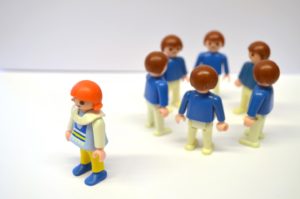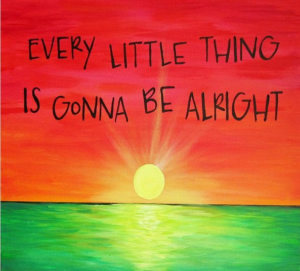In Times of Anxiety, the Importance of the Human Touch

(photo by Corrinna Bain)
9 April 2020
Dear friends,
Three people from the ATD Fourth World community are now in mourning for loved ones who have died of Covid-19. Sadly, no funerals are possible. We are keeping them in our thoughts as well as several others who are suffering from symptoms of the virus.
As people across the world try to maintain physical distance to stop the spread of Covid-19, a woman living in poverty in Islington tells us that pervasive anxiety is affecting interactions:
“Some people are getting a very bad attitude. At the shop, we were all distanced in the queue. When it was my turn to be served, I needed to check the price of an item and moved slightly away from the queue. It was just for two seconds and then I came back. But suddenly another woman started freaking out, saying ‘Get away from me!’ I wasn’t even near her! There was enough space between us. People need to be more understanding.
“It’s like when we were kids, they’d say, ‘You can’t play with us; you’ve got the lurgy!’
“It’s the same for this young woman who’s homeless. I stopped to talk to her and she said she’d been phoning and phoning to try to find help and a place to sleep but she was never getting through. People want to cut you short. Not everyone, but when you call for help, like I’m trying to do for my assessment [for Personal Independence Payment benefits], they just say, ‘The computer says no’. That’s the official line and they stick to the limits of their job. They need to listen to people. You’re telling them your problem and you think you’re being clear—but I feel like I’m talking to the air. People act like artificial intelligence. You might as well be talking to a machine because there’s not that human touch.”
The need for the human touch (at a safe distance, of course) has underpinned our efforts to reconnect with people in the ATD Fourth World community. The woman quoted above was speaking in a meeting via Zoom that included eight people preparing to contribute to the Poverty2Solutions network. For Zoom to be feasible, our core team offered extra support to people who face substantial challenges accessing technology and data, or who have trouble with computer literacy. Since our letter of 2 April, as part of the APLE Collective we published this blog post to point out that responses to Covid-19 must cross the digital divide to connect us all.
We also remain concerned about the challenges that Covid-19 is creating for families whose children are in long-term foster care or who have cases pending in family court. One mother in this situation was not informed until three days before her court date that the entire proceeding would take place over the telephone. We support the efforts by the Nuffield Family Justice Observatory to closely monitor these situations as well as this survey by the Transparency Project.
We continue to support RAPAR’s Open Letter on behalf of all undocumented people, destitute people and migrant people. We also appreciate Amnesty’s advocacy for this cause.
Many people we are in touch with say they feel low and anxious. Some are working in shops where they are treated rudely by customers looking for non-essential items. The mother of one of these workers said, “My son has asthma and he’s putting his life on the line for them to buy their barbecues and redecoration supplies.”
Getting groceries remains a particular challenge for people in poverty who feel panicked when finding empty shelves in the places they could once afford. Now they must shop further from home. Because people with reduced mobility need to avoid the long queues in supermarkets, they go to corner shops where they find significant mark-ups. In one shop, plastic bags that once cost 10 pence are now being sold for a full pound. Online grocery shopping is not an option because the minimum spend is often £40—far more than an individual in poverty can afford at once. in a single week. The shops where electric meter keys could be topped up have closed so now this must be done at the post office—which is small and crowded, making it difficult to keep at a distance from others.
A parent in a crowded living situation says that her special needs children “are bouncing off the walls”. In an effort to provide activities for children stuck at home, ATD is mailing arts-and-crafts activity packs to children we know. As Easter approaches, these now feature bunnies and eggs, a reminder of normal life at this stressful time.
A family with three children has so far received free lunch vouchers for only one of them. This is because their 3-year-old is not yet registered for school. Also one of their older children’s schools will not begin providing any food vouchers until after Easter. They have not been told why one school has managed to provide the vouchers while the other is delaying. Another family with two children is struggling to understand why they are receiving no school food vouchers at all.
The UK government once aimed to end child poverty by 2020. However, even before the current crisis this goal was far from being met. Two new books examine the lessons to be learned from efforts to overcome poverty in the UK. ATD Fourth World contributed a chapter to 2020 Vision: Ending Child Poverty for Good, published by the Child Poverty Action Group. And ATD member Amanda Button is quoted in Ending Child Poverty: Twenty Years On, published by UNISON.
Some adults whose homes are cramped say they feel particularly lonely and are literally hanging out the window for fresh air. They also find it stressful that whenever they need to ask about how things have been reorganised, “People talk so quickly giving too much information at once. Trying to take it in is exhausting”. For adults who are particularly isolated, we have been mailing mindfulness colouring pages and looking for books or puzzles that would appeal to them. Donations are welcome to support our efforts, via Just Giving.
Even in normal times, one of ATD’s key goals is to overcome the social isolation that people in poverty experience. Now more than ever, maintaining social connections is important so that people have the strength to carry on. During the Zoom meeting cited at the beginning of this letter, one participant said:
“This feels a little like being a prisoner and I’m missing my partner like anything—but we have to look at the positives.”
This prompted another participant to sing Bob Marley’s “It’s Alright”, which several others joined in.
(Painting by Michelle Eshleman)
Angela Babb, a long-time ATD activist, concluded:
“We’re all in this together and we’ll get through it together.
“If we worry too much, it can make us ill so we have to keep our spirits up.
“We have to listen to the government: stay home, keep calm, and we’ll get through this.”
With Angela, we encourage all of you to keep your spirits up as best you can.
Diana Skelton and Thomas Croft
National Coordination Team




